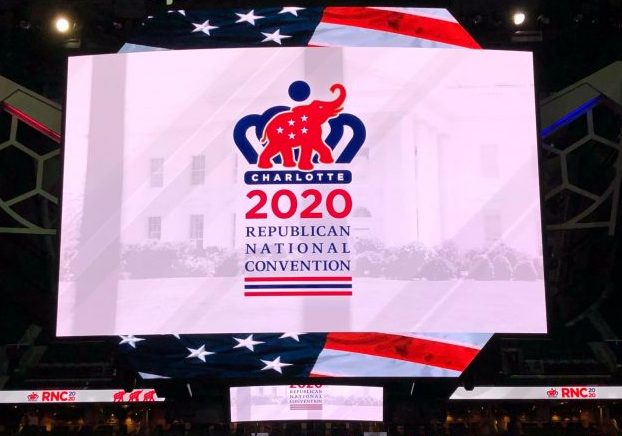As the delegates at the 2020 Republican National Convention officially nominated President Donald J. Trump, it became ever more clear how much the party of conservatism has morphed into the party of Trump.
On Monday, Trump made a surprise appearance in Charlotte at the site of the convention. He arrived to the small crowd chanting “Four more years.” His opening remark by way of response: “If you want to really drive them crazy, you say 12 more years.”
The party made clear its dedication to the typical conservative values and causes: an emphasis on family, faith and country; dedication to the first and second amendment rights; opposition to abortion – all amid a storm of unwavering support and fervent praise for the president.
In fact, speeches focused more on the character of the president than policy overall, with the Alabama delegate highlighting his state’s support for the incumbent (57%, compared to the nation’s 42%), which is highest in the nation. Similarly, the delegate from Montana affectionately referred to his home state as “Trumptana” and South Carolina governor Henry McMaster claimed the state would have voted for Trump when it was founded in 1670 had that been possible. Gov. Kristi Noem of South Dakota, before an ecstatic crowd, thanked the president for “bringing fireworks back to Mount Rushmore.”
In a parallel context, the party continues to insist the Trump administration adequately handled the coronavirus pandemic, praising the response and refusing to acknowledge the devastating reality of the past several months. “In the midst of this pandemic, the leadership of this president and the compassion of the American people showed forth,” Vice President Mike Pence said.
The reality on the ground, however, is that the United States is currently the most affected nation in the world, with 5.7 million cases, 176,000 deaths and continuing, unchecked contagion. Reported daily cases have ranged between 20,000 and 60,000 since April and the recent reopening of education institutions has led to outbreaks in schools and surrounding communities nationwide.
Highlighting the general sense of attack-mode being presented at the conference, speakers frequently reiterated language used by the president to discuss his political opponents, namely Democratic nominee Joe Biden and his running-mate, Kamala Harris.
The delegate from Arkansas denounced the “radical Democratic ticket that has emerged from the D.C. swamp,” while former Gov. Scott Walker of Wisconsin called Joe Biden a “creature of the swamp” and said he has out-sourced his agenda to the radical left, a phrase often used by Trump.
The fundamental economic and social anxieties of Trump’s base of ardent supporters make them receptive to his America-first rhetoric: vague promises to revitalize industry, combative approaches to relations with China and strong opposition to the Democratic Party, which he has branded as being hijacked by radical socialists who plan to steal the election by expanding access to mail-in voting. Trump’s slogans of “Make America Great Again” and “Keep America Great” allow the predominantly white base to feel secure in the president’s vision, able to levy blame to perceived outsiders, without having to confront the fundamentals of what it is that makes them uneasy.
In the early stages of the RNC, Trump and the Republican Party showed little indication they had different messaging in store for the rest of the election campaign. Of course the party continues to be that of small government – low taxes and American patriotism, one that supports law enforcement and the military, vocalizes its opposition to abortion and decries welfare and government assistance as socialism – but GOP strategists seem to see little mileage in policy messaging, instead focusing on heightened, inflammatory discourse.
Hearing this familiar, divisive approach leaves traditional Republicans looking on wondering if their party has changed forever, and leaves a key question hanging in the air: does the GOP now care more about the trappings of power, whatever the cost, than it does about coherence of political position and argument?
The President has repeatedly called this the most important election in history. It comes in the midst of social upheaval and an infectious pandemic, with a looming economic recession and brewing ecological crisis. He offers a commitment to law and order and promises tax breaks and dedication to free market, capitalist values, but the intense political atmosphere surrounding his administration makes many Americans fearful and is symptomatic of a nationwide culture war that has been brewing since before his victory in 2016.
Whatever the result of this election, moderate voters on all sides of the political spectrum worry that what has already taken place is the blasting open of a Pandora’s Box which the nation will find impossible to seal, regardless of whoever wins on November 3rd.
For Times Media Mexico
Henry Haney in North Carolina



